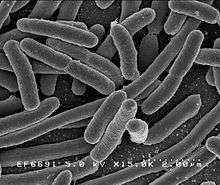bacteria
English

scanning electron micrograph of E. coli bacteria
Etymology 1
From New Latin bacteria, plural of bacterium, from Ancient Greek βακτήριον (baktḗrion), neuter diminutive of βακτηρία (baktēría, “rod, stick”) (cognate with English peg).
Usage notes
- This is the plural form of the word. While it is often used as if it were singular (as a collective noun), this is considered nonstandard by some in the US and more elsewhere. See the usage examples under bacterium.
Derived terms
Translations
see also under bacterium
bacteria
|
|
See also
- culture (collective noun)
Etymology 2
From New Latin bacteria, from Ancient Greek βακτηρία (baktēría, “rod, stick”).
Noun
bacteria (plural bacteriae)
Latin
This article is issued from
Wiktionary.
The text is licensed under Creative
Commons - Attribution - Sharealike.
Additional terms may apply for the media files.